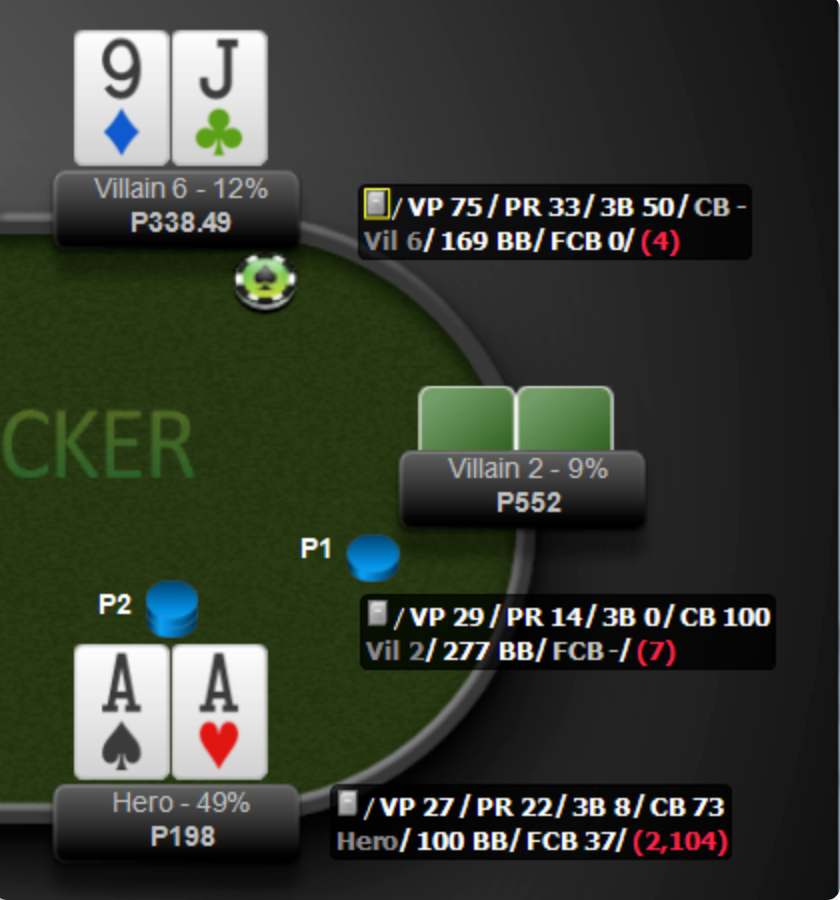When Information Sours Decision-Making
I began playing poker in the early aughts. No-limit-holdem was skyrocketing to popularity, online casinos were offering absurd bonuses to join their sites, and the games were fat and easy. No fancy "I know that he knows that I know" thinking required. Just bet and raise with good hands and fold with bad hands.
As online poker became more popular, developers created software to give the grinders an edge. Wouldn't it be great to have statistics on all of the players you played against? Yes, I thought. So I started using Poker Tracker, which created an overlay for your online tables, filled with player stats like the pre-flop raise percentage (how often does this player raises before the flop) or the went-to-showdown percentage (how often the player calls bets all the way to the river). There's a lot of different interesting statistics and you could customize them to your liking.

This seems great. You can bully players who tend to fold hands by being more aggressive (and be more confident they have strong hands when they call). And you can value-bet the hell out of loose players. But the software wasn't as helpful as I though it was going to be.
At the time, the software passively collected data on the tables you were sitting at. So, you might have 100 hands or 1000 hands from someone who plays regularly with you. And you might have 10 hands from three other people who show up rarely. Over time, your sample sizes get larger and larger, leading, in principle, to more accurate statistics (presuming that players don't ever change their play styles). But at a table with seven or eight other players, perhaps only one or two were regulars, whom you had a lot of hands on.
Officially, you had numbers on everyone. But useful numbers? Less clear.
Maybe this is just a personal failing, but I find it very hard to ignore data that I see. Even though, intellectually, I knew that stats on someone with only ten (or 20 or 30) hands was practically useless, it was some information. And some information is better than no information, right? But how much to weigh that information in the context of the current hand?
Another way of looking at it is that Poker Tracker created information and also misinformation. Although it didn't tell me anything that was untrue – by default, it displayed how many hands of data it had on each player, so it's telling you the sample size, among other statistics – the context of the statistics encouraged me to over-value some of that information.
One solution, of course, would be to create a rule like, "only display statistics for users with over 300 hands in the database." Now we have a decently large sample, so we should be able to rely on those numbers. But can we?
If you had looked at my stats back then, you would have found pretty average numbers. I was a tight player, especially in environments where people tended to call me down anyways. Nothing remarkable. The numbers tell you something. But do you know how I'm playing today? At this table? How I play in a specific position? Or how I alter my play when fewer people are sitting at the table?
In some cases, the numbers could tell you a lot – extremely tight or extremely loose play can be easily exploited. But often, the numbers were just meh. It was hard to figure out how relevant those numbers were to the current action in the hand.
The deeper problem was that the stats pulled my attention away from the action. I can only consider so many things at once during my decision-making process. The attention I'm paying to Poker Tracker's numbers is attention I'm not paying to earlier action in the hand.
I've had the same experience with GPS. When the system works flawlessly, it's great. Just rely on the GPS. And when you already know exactly where you're going, it's great – no need to use the GPS. But when you're in a situation where you have to integrate GPS information with your own knowledge of the area, it's stressful.
I don't know whether Taiwan's streets were simply less mapped out than the States' streets when I moved there or whether the infrastructure of Taipei confused my maps app (there are often side streets underneath major highways, and GPS has trouble distinguishing those locations), but for whatever reason, it was frustrating as hell to use GPS there circa 2018-20.
The divide between Poker Tracker's stats and the action in the hand (and between the GPS and my own knowledge of an area) is also one between quantitative and qualitative evidence. Relying on landmarks, interpreting road signs, maintaining a sense of direction – these are all qualitative. Interpreting the betting action to narrow my opponents' possible hands – qualitative.
It's easy to turn toward the data and rely on it, like a crutch. But sometimes even accurate data does not lead to improved decision-making. A major hurdle is figuring out how to integrate different sources of information together effectively.
Member discussion